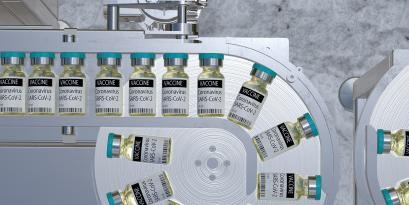Information as of March 5, 2021
Thank you for your interest in St. Joseph Health's COVID-19 vaccine information. Information about the COVID-19 vaccine changes rapidly. As we learn more, we will update this page.
St. Joseph and the Vaccine Hub have discontinued our wait list and moved to a universal website for vaccine appointment scheduling. To determine your eligibility for the COVID-19 vaccine and schedule an appointment, visit the Brazos County Community COVID-19 Vaccination Hub website.
*If you registered on the St. Joseph Health wait list between February 26 and March 4, you should expect to receive an invitation to schedule a vaccine appointment today and over the next two days.
St. Joseph Health has been selected by the State of Texas to serve as a vaccine hub. The Brazos County Community COVID-19 Vaccination Hub has been organized to serve Brazos Valley residents through the collaboration of several organizations including St. Joseph Health, Brazos County, the Cities of Bryan and College Station, Texas A&M University, the American Red Cross, the United Way Brazos Valley and numerous other volunteers.
The hub is located at the Brazos Center: 3232 Briarcrest Drive in Bryan, 77802.
The Hub operates on an appointment basis only and will be limited by vaccine allocations each week. Please note that the Brazos Center is only the providing facility for this hub. They do NOT control the vaccination, registration, scheduling, or distribution processes.
Vaccines are given on a first-come, first-served basis. Walk-ins are not accepted. Appointments are required and will be limited to the number of vaccines we have. As we receive additional vaccines, more appointments will become available.
The Texas Department of State Health Services (DSHS) has determined allocations and defined patient populations by phase: Phase 1a and 1b distributions are intended for healthcare personnel, residents and employees of long-term care facilities (e.g., nursing homes), people at risk for severe illness (65+, underlying medical condition) and other vulnerable frontline workers. Phase 1c distributions are intended for people age 50-64, as well as people working in education, specifically:
As of March 29, 2021, all adults age 18 and older are eligible to receive the COVID-19 vaccine, as set by the DSHS.
For more information, please refer to our Frequently Asked Questions. If you are interested in receiving the vaccine series, please visit the Vaccine Hub website to check for appointment availability.
Vaccines to protect against COVID-19 are available now. The FDA has issued Emergency Use Authorizations (EUA) for the Pfizer and Moderna COVID-19 vaccines. Distribution of the vaccine is determined by state and local health departments and some St. Luke’s Health facilities with supply of the vaccine are participating in the administration of COVID-19 vaccines according to that distribution plan.
At St. Luke’s Health, safety is our highest priority, and we only administer vaccines that are recommended by the FDA as safe and effective.
CDC recommendations indicate a phased approach to vaccine allocation, beginning in Phase 1a with health care workers, first responders, and residents of long-term care facilities. Phase 1b includes people over age 65 and people under age 65 who have underlying medical conditions. As vaccine supply increases, vaccines may be more widely available to the public in the coming months.
If you qualify for the current phase of distribution, please refer to the Texas COVID-19 Vaccine Provider Locations map for providers in your area. It is important to contact facilities prior to showing up to ensure they have vaccines available.
The Pfizer and Moderna vaccines require two doses, administered three or four weeks apart. When a vaccine is given, information will be provided about when to get the second dose.
For additional information on the COVID-19 and the vaccine approval process, we recommend reviewing the FAQs on the CDC website and FDA website.





